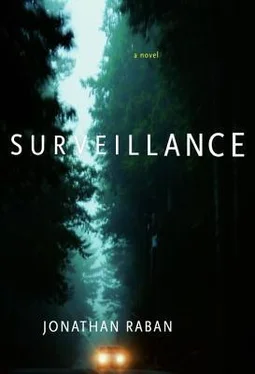THE PILATES STUDIO on South Main looked to Lucy like a dominatrix’s well-appointed dungeon. Walled on three sides by floor-to-ceiling mirrors, it was furnished with gruesome implements — the Reformer, the Half-Trapeze Bed, the Ladder Barrel, the Tower, the Ped-a-Pul. Huffing and groaning, half a dozen other clients, male and female, were being punished by trainers in spa pants and black hoodies.
The first check from GQ , for preliminary research and expenses on the Vanags piece, had come through. Lucy was spending $280 on a month’s worth of weekly Pilates classes to try to get herself in shape. She nearly backed out of the deal when she saw the bodies in the studio, most of whom would’ve looked good on the frieze around a Grecian urn. Wearing her old sweats, she felt painfully self-conscious, a dandelion among the orchids, but took comfort from the sight of a sturdy red-faced woman in her fifties who was being tortured on the Reformer by a gay-looking Adonis. If she could go through with it, surely Lucy could.
“Find your abdominals,” said Lindsay, Lucy’s trainer. “Suck them in as if you’re pulling them out through your back.”
All very well for Lindsay to issue this impossible command: she was a dancer, sore at having just lost her job in the corps at Pacific Northwest Ballet. Lucy wasn’t sure she even had abdominals anymore, and though she sucked and sucked, all she achieved was a very modest diminution of the intractable mound that was her stomach.
“This is like cellular. Your body feels things even if your mind refuses.”
I don’t do woo-woo, Lucy thought, spouting air like a breaching whale.
“But it was turning into a really hostile work environment for me,” Lindsay said. “They brought in this new woman as ballet master — Martha Slater, a control freak and a total bitch. Okay, now we’ll do circles.”
Circles meant Lucy opening her legs and waving them round and round, exposing her crotch to the world.
“Wider!”
Wider still and wider, Lucy felt as if she was posing for beaver shots. She stared resolutely at the ceiling to avoid catching her reflection in the mirrors.
“But after like six years at PNB, to get canned like that was such a bummer I could’ve offed myself when I heard.”
“I know,” Lucy gasped. “It’s awful. It’s happening to everyone. The d-d-d-downturn in the economy…”
“Anchor — don’t arch —your sit bones!”
Wearily, Lucy rearranged herself.
“Knees in tabletop!”
At least she could now keep her legs together.
“Your sit bones make you focus on your core. Now you have to say to yourself, ‘My core is strong and solid.’”
And that, Lucy thought, was her abiding problem. It was her mother’s perennial accusation that she had no core, that she was an insipid sopper-up of other people’s feelings and opinions, by which she meant in the first instance that Lucy spent far too much time listening to her dad. Though she fought her mother fiercely, Lucy had always been depressingly conscious that she might have a point. On down days, she wondered if perhaps it was her lack of core that had led her into journalism — a trade where a good listener, a human sponge, could hide her secret corelessness behind a bold-type byline. Every opinion she held was provisional, and a smart remark by someone else could alter it in a heartbeat. She was instinctively reluctant to “commit”—to men, to salaried jobs, to causes, to ideas. To remain not entirely sure of where she stood had become a lifelong habit, almost a principle. As to this core business, if core meant some unique and irreducible essence of self, Lucy was as unsure of that as she was of most things. But she was absolutely certain that if she did have a core, she wouldn’t find it in a Pilates studio with her fucking “sit bones.”
So they talked about the ballet company, Lucy drawing Lindsay out. By the end of the hour, after the agonizing “hundreds,” Lucy could’ve written a feature on the tribulations of being a dancer in the corps — her pay, her many diets, her smoking to stay thin, her tendonitis, her shallow hip sockets, her hamstrings, her cheating boyfriends, her shrinking dream of making it to principal. At twenty-four, Lindsay was as grimly experience-hardened as a forty-year-old. Did she really say to herself, and mean it, “My core is strong and solid”? Maybe so — and, if so, lucky her. Not sure of what the form was here, Lucy tipped her twenty bucks at the end of the session, which Lindsay, looking grateful but furtive, tucked inside her sports bra for safekeeping.
ALIDA TAPPED on Tad’s door.
“Ali!” Sag-shouldered, puffy-eyed, Tad looked less like Tad than some character he was acting in a play, a man crushed by sudden bad news.
Frightened, Alida held out her arms for a hug, thinking that the hug would say more than the words she’d prepared. She clung to him for a moment: a + b, and a million miles from x.
“Ali.”
“You know what? The dogfish stuff? I got scared, but he didn’t mean to scare me, he was just telling me the truth, and I was being stupid and I scared myself, it wasn’t him, it was all me, he’s not like bad or anything, he’s…” Alida felt she wasn’t saying this right. It had sounded much better when she’d rehearsed it in her head.
“Oh, Ali. Right, and right, and right again. I got mad over nothing — nothing. I’m so sorry. It’s a lousy fact of life that sometimes people do get mad for no good reason at all. I had a sort of brain fart.”
“I had a brain fart today. I got really mad at Gail.”
“What about?”
“Nothing.”
“Weird, isn’t it, that nothing makes so many things happen? It’s so important it really ought to have a different name.”
Alida thought for a moment, then said, “Factor Zero?”
“I love you, Ali.”
“I love you, too.”
“Factor Zero. Now I have the word for it. I’ll always call it Factor Zero.”
“I have this idea,” Alida said, revealing her project to the world for the first time, “that everything is really algebra.”
“And you know what? I was always terrible at math in school.”
“Will you come to dinner tonight?”
“I’d love to come to dinner, but I promised Gilda — you remember Gilda?”
“Yeah, she’s the actress, right? She was with you in that play.”
“I have to take her out to a fancy meal in a restaurant. She’s going through a rough time. A lot of people are going through a rough time right now. It’s Factor Zero at work again.”
Leaving Tad’s apartment, Alida was reminded of kayaking — the giddy elation of being afloat and in control. She’d taken charge, she’d used her paddle right, her boat had skimmed safely over the yawning deeps below.
“I DON’T want to go.”
It was 9:30, and Lucy and Alida were snuggling in Alida’s narrow bed.
“Why, Rabbit?”
“I don’t know, I just don’t.”
“But yesterday you wanted to go so badly.”
“Yeah, but that was yesterday.”
Watching the troubled face beside her on the pillow, Lucy cast about for irresistible inducements. The whole weekend would be thrown out of balance if Alida stayed home. The invitation had been provoked by Alida’s eagerness to go kayaking again, not because Lucy had wanted more face time with her subject. It was essential that Alida come along. It didn’t help Lucy’s mental clarity that every muscle in her body ached from the Pilates class. She said, “You were getting so great at kayaking…”
“You can go. I can stay with Tad.”
Tad! Damn him! Alida had gone to his apartment after school and come back with an ambiguous Gioconda smile, saying nothing of what had transpired between them. Evidently they’d made a pact — Tad and Alida versus the Vanagses, like the Allies against the Axis powers.
Читать дальше












